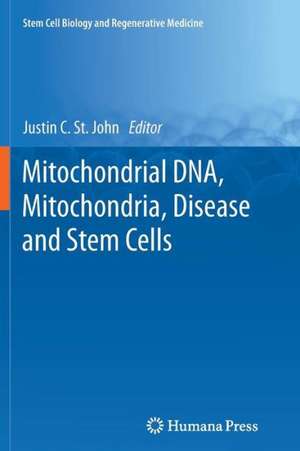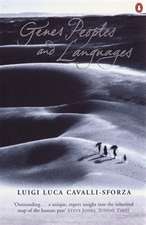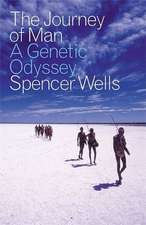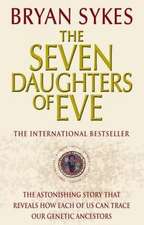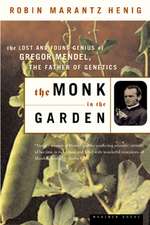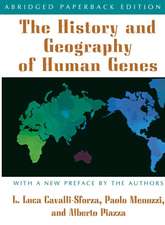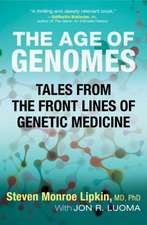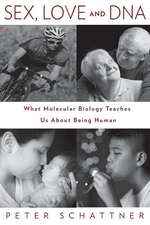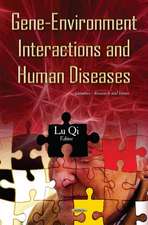Mitochondrial DNA, Mitochondria, Disease and Stem Cells: Stem Cell Biology and Regenerative Medicine
Editat de Justin C. St. Johnen Limba Engleză Paperback – 15 oct 2014
| Toate formatele și edițiile | Preț | Express |
|---|---|---|
| Paperback (1) | 625.05 lei 3-5 săpt. | +14.61 lei 4-10 zile |
| Humana Press Inc. – 15 oct 2014 | 625.05 lei 3-5 săpt. | +14.61 lei 4-10 zile |
| Hardback (1) | 944.19 lei 6-8 săpt. | |
| Humana Press Inc. – 27 sep 2012 | 944.19 lei 6-8 săpt. |
Din seria Stem Cell Biology and Regenerative Medicine
- 15%
 Preț: 641.71 lei
Preț: 641.71 lei - 18%
 Preț: 958.07 lei
Preț: 958.07 lei - 18%
 Preț: 897.65 lei
Preț: 897.65 lei - 18%
 Preț: 1122.56 lei
Preț: 1122.56 lei - 18%
 Preț: 1118.62 lei
Preț: 1118.62 lei - 18%
 Preț: 1556.64 lei
Preț: 1556.64 lei - 18%
 Preț: 1222.31 lei
Preț: 1222.31 lei - 18%
 Preț: 1280.72 lei
Preț: 1280.72 lei - 18%
 Preț: 948.61 lei
Preț: 948.61 lei - 18%
 Preț: 1280.24 lei
Preț: 1280.24 lei - 5%
 Preț: 779.16 lei
Preț: 779.16 lei - 18%
 Preț: 1278.02 lei
Preț: 1278.02 lei - 18%
 Preț: 947.35 lei
Preț: 947.35 lei - 18%
 Preț: 949.55 lei
Preț: 949.55 lei - 18%
 Preț: 951.29 lei
Preț: 951.29 lei - 18%
 Preț: 953.65 lei
Preț: 953.65 lei - 15%
 Preț: 691.12 lei
Preț: 691.12 lei - 18%
 Preț: 1220.75 lei
Preț: 1220.75 lei - 18%
 Preț: 956.81 lei
Preț: 956.81 lei - 15%
 Preț: 643.16 lei
Preț: 643.16 lei - 18%
 Preț: 1229.91 lei
Preț: 1229.91 lei - 15%
 Preț: 693.71 lei
Preț: 693.71 lei - 18%
 Preț: 944.99 lei
Preț: 944.99 lei - 15%
 Preț: 692.74 lei
Preț: 692.74 lei - 18%
 Preț: 1222.01 lei
Preț: 1222.01 lei - 15%
 Preț: 696.18 lei
Preț: 696.18 lei - 18%
 Preț: 959.98 lei
Preț: 959.98 lei - 18%
 Preț: 963.91 lei
Preț: 963.91 lei - 18%
 Preț: 1380.47 lei
Preț: 1380.47 lei - 15%
 Preț: 690.44 lei
Preț: 690.44 lei - 15%
 Preț: 641.85 lei
Preț: 641.85 lei - 18%
 Preț: 1837.45 lei
Preț: 1837.45 lei - 15%
 Preț: 646.11 lei
Preț: 646.11 lei - 18%
 Preț: 1118.62 lei
Preț: 1118.62 lei - 5%
 Preț: 777.55 lei
Preț: 777.55 lei - 18%
 Preț: 1222.01 lei
Preț: 1222.01 lei - 18%
 Preț: 1241.73 lei
Preț: 1241.73 lei
Preț: 625.05 lei
Preț vechi: 762.26 lei
-18% Nou
Puncte Express: 938
Preț estimativ în valută:
119.64€ • 130.00$ • 100.56£
119.64€ • 130.00$ • 100.56£
Carte disponibilă
Livrare economică 01-15 aprilie
Livrare express 15-21 martie pentru 24.60 lei
Preluare comenzi: 021 569.72.76
Specificații
ISBN-13: 9781627038676
ISBN-10: 1627038671
Pagini: 200
Ilustrații: X, 190 p.
Dimensiuni: 155 x 235 x 11 mm
Greutate: 0.29 kg
Ediția:2013
Editura: Humana Press Inc.
Colecția Humana
Seria Stem Cell Biology and Regenerative Medicine
Locul publicării:Totowa, NJ, United States
ISBN-10: 1627038671
Pagini: 200
Ilustrații: X, 190 p.
Dimensiuni: 155 x 235 x 11 mm
Greutate: 0.29 kg
Ediția:2013
Editura: Humana Press Inc.
Colecția Humana
Seria Stem Cell Biology and Regenerative Medicine
Locul publicării:Totowa, NJ, United States
Public țintă
Professional/practitionerCuprins
Clinical Approach to the Diagnosis of Mitochondrial Disease.- Mitochondrial DNA Mutations and Their Effects on Complex I Biogenesis: Implications for Metabolic Disease.- Embryonic Stem Cells: A Signalling Perspective.- From Oocytes and Pluripotent Stem Cells to Fully Differentiated Fates: (Also) A Mitochondrial Odyssey.- From Pluripotency to Differentiation: The Role of mtDNA in Stem Cell Models of Mitochondrial Diseases.- The Role of Mitochondrial DNA in Tumor Cells.- Assisted Reproductive Technologies to Prevent the Transmission of mtDNA from one Generation to the Next.
Notă biografică
Professor Justin St. John was awarded his PhD in 1999. In 2000, he was awarded a Mellon Fellowship at the Oregon National Primate Research Center, Oregon, USA. His achievements as an early career scientist led to his rapid promotion to the position of Professor at the University of Warwick (2007). Whilst in the UK, he was funded by the Medical Research Council and received an Endeavour Fellowship to undertake a period of research at Monash Institute of Medical Research where he has been Director of the Centre for Reproduction and Development and a Professor in the Faculty of Nursing, Medicine and Health Sciences at Monash University since November 2009. His research focuses on developing and using specific model systems to understand how mitochondrial DNA is transmitted and replicated. He was the first to demonstrate that sperm mitochondrial DNA could persist in the late stage embryo and thus be transmitted; describe mitochondrial DNA replication events in undifferentiated and differentiating embryonic stem cells; and demonstrate why donor cell mitochondrial DNA is transmitted to embryos and offspring following somatic cell nuclear transfer. He is using these outcomes to develop mini-pig models of mitochondrial DNA disease and reproductive strategies to prevent the transmission of mutant mitochondrial DNA from one generation to the next. He has published in The Lancet, Nature Chemical Biology, Nature Cell Biology, Stem Cells, Journal of Cell Science, and Genetics.
Textul de pe ultima copertă
This volume investigates how the mitochondrial genome is transmitted, segregated, and inherited. It starts by describing mtDNA mutations and deletions and how these impact on the offspring’s well-being. It progresses to discuss how mutations to the mtDNA-nuclear-encoded transcription, replication and translational factors lead to mtDNA-depletion syndromes and how these affect cellular function and lead to the pathology of human mitochondrial disease. It also highlights the importance of the mitochondrial assembly factors and how mutations to these can lead to mitochondrial disease. The reader is then introduced to how mtDNA is transmitted through the oocyte and how stem cells can be used to study mitochondrial biogenesis and mtDNA replication and transcription in undifferentiated pluripotent and differentiating cells and how mitochondria adapt during this process. It then discusses how diseases like cancer are initiated and regulated by mutations to mitochondrial DNA and dysfunctional mitochondria. Finally, it draws on assisted reproductive technologies to discuss how some of these approaches might be adapted to prevent the transmission of mutant and deleted mtDNA from one generation to the next.
Caracteristici
Cutting-edge research Leading scientists and researchers as contributors comprehensive coverage of a hot topic Describes processes of mitochondrial biogenesis and mitochondrial DNA replication as well as pluripotency and differentiation Includes supplementary material: sn.pub/extras
